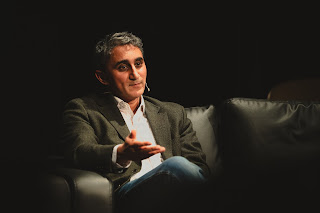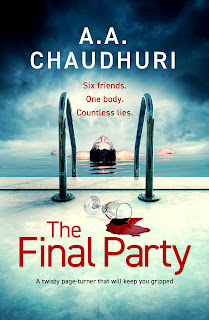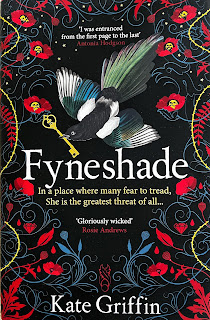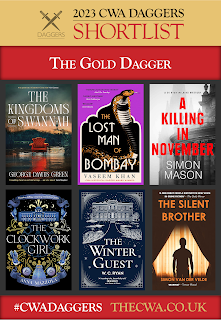The 2023 shortlists for the prestigious Crime Writers’ Association (CWA) Dagger awards, which honour the very best in the crime-writing genre, have been announced.2023 marks the CWA’s 70th Platinum Jubilee Year; the Daggers are the oldest awards in the genre, created in 1955.
The Gold Dagger, which recognises the crime novel of the year, sees Vaseem Khan’s The Lost Man of Bombay make the shortlist. It’s the third novel in his historical crime series set in 1950s India. The first in the series, Midnight at Malabar House, received the CWA Historical Dagger in 2021.
Khan is pitted against WC Ryan’s gothic mystery The Winter Guest, set during the Irish war of independence. Simon Mason also makes the shortlist with A Killing in November, which bravely takes on Morse’s classic Oxford setting and was a Sunday Times Crime Book of the Month.
Also up for Gold is Anna Mazzola’s The Clockwork Girl, praised as an intoxicating story of obsession set in Paris. The Clockwork Girl has also been shortlisted for the Historical Dagger. George Dawes Green with The Kingdoms of Savannah and Simon Van der Velde’s The Silent Brother are also in contention for Gold.
Sponsored by Ian Fleming Publications Ltd, the Fleming family-owned company that looks after the James Bond literary brand, the Steel Dagger celebrates the thriller of the year. Big hitters on the shortlist include Robert Galbraith with The Ink Black Heart and Linwood Barclay’s Take Your Breath Away. Last year’s winner, MW Craven, returns with The Botanist, his fifth novel in the hugely popular Washington Poe and Tilly Bradshaw series. John Brownlow’s Seventeen, Alias Emma by Ava Glass and May God Forgive by Alan Parks are also in contention for the Steel Dagger.
Maxim Jakubowski, Chair of the Crime Writers’ Association, said: “As always with the Daggers, the titles on the shortlists showcase the very best in the genre from leading publishing houses to the smaller independents, including fiction in translation, the short story, debut, and unpublished authors to watch. We are proud to say that no other awards truly showcase the depth and breadth of talent in this enduring genre.”
 The CWA welcome new sponsor, International Literary Properties (ILP), for the ILP John Creasey (New Blood) Dagger. ILP own, invest in and proactively manage the estate of the late John Creasey, who founded the CWA and whose name is associated with the award for best debut novel.
The CWA welcome new sponsor, International Literary Properties (ILP), for the ILP John Creasey (New Blood) Dagger. ILP own, invest in and proactively manage the estate of the late John Creasey, who founded the CWA and whose name is associated with the award for best debut novel.
The award-winning journalist Amanda Cassidy has her first novel Breaking on the debut shortlist, alongside Australian writer Hayley Scrivenor, with her debut Dirt Town, a number one Australian bestseller.
Emma Bell, SVP Creative and Brand and Executive Producer for ILP, said: “John Creasey was a truly original talent. His tenacity and flair are an inspiration for writers everywhere and so it is fitting that his spirit is celebrated annually through the John Creasey (New Blood) Dagger.”
The shortlist for the Historical Dagger includes Harini Nagendra with her fiction debut The Bangalore Detectives Club, set in the cacophony of 1920s Bangalore. A Financial Times Book of the Year, Blue Water by Leonora Nattrass also makes the shortlist, praised for combining page-turning detective fiction with eighteenth-century political intrigue. Other contenders are DV Bishop’s The Darkest Sin, The Homes by JB Mylet, and Sarah Smith’s Hear No Evil.
 The Crime Fiction in Translation Dagger, sponsored in honour
The Crime Fiction in Translation Dagger, sponsored in honour
of Dolores Jakubowski, sees The Bleeding by French novelist Johana Gustawsson (translated by David Warriner) pitted against the great Spanish writer, Javier Cercas, and his international bestseller, Even The Darkest Night (translated by Anne McLean). Also, up for the accolade is Good Reasons to Die by Morgan Audic, set in the radioactive Chernobyl exclusion zone in a dislocated Ukraine, translated by Sam Taylor. French authors Hervé Le Tellier and Michel Bussi, alongside China’s bestselling Zijin Chen, also make the shortlist.
The CWA Daggers are one of the few high-profile awards that honour the short story. This year’s shortlist includes the mother and daughter duo, Victoria Dowd and 16-year-old Delilah Dowd, with The Tears of Venus. They face stiff competition with short stories from Leigh Bardugo, Sanjida Kay, Abir Mukherjee, CJ Tudor and Hazell Ward.The ALCS Gold Dagger for Non-Fiction shortlist includes 2020’s Diamond Dagger winner Martin Edwards with his non-fiction opus The Life of Crime. He’s up against The Poisonous Solicitor, the true story of a 1920s murder mystery by Stephen Bates, praised for his meticulous research.
 The shortlist also features About A Son, A Father’s Search for Truth by David Whitehouse, which was praised by Elizabeth Day as “a dispatch from the frontiers of the human heart”. Authors Wendy Joseph, Amit Katwala, Julie Mackay, and Robert Murphy are also on the non-fiction list.
The shortlist also features About A Son, A Father’s Search for Truth by David Whitehouse, which was praised by Elizabeth Day as “a dispatch from the frontiers of the human heart”. Authors Wendy Joseph, Amit Katwala, Julie Mackay, and Robert Murphy are also on the non-fiction list.

The Dagger in the Library is voted on exclusively by librarians, chosen for the author’s body of work and support of libraries. This year sees firm favourites from the genre: Ben Aaronovitch, Sophie Hannah and, for the first time on this list, Mick Herron, famed for the hit Jackson Lamb novels.

The Dagger for the Best Crime and Mystery Publisher, which celebrates publishers and imprints demonstrating excellence and diversity in crime writing, features Harper Fiction, Mantle, Michael Joseph, Pushkin Vertigo, Quercus and Viper.The Dagger for the Best Crime and Mystery Publisher, which celebrates publishers and imprints demonstrating excellence and diversity in crime writing, features Harper Fiction, Mantle, Michael Joseph, Pushkin Vertigo, Quercus and Viper.
The Daggers also celebrate unpublished authors with its annual competition for aspiring crime novelists, the Debut Dagger, sponsored by ProWritingAid. The competition to find the best new voices in the genre has been finding the next big names in crime fiction for over 20 years. The winner will receive £500 as well as the attention of leading agents and top editors; over two dozen past winners and shortlisted Debut Dagger authors have been signed to date. The CWA Diamond Dagger, awarded to an author whose crime-writing career has been marked by sustained excellence, is announced in early spring each year and in 2023 it was awarded to Walter Mosley.
The winners will be announced at the Daggers awards night on Thursday 6 July at the Leonardo City Hotel in London, with guest speaker, author Charlie Higson.
The winner of the Margery Allingham Short Mystery Prize, run by the CWA in partnership with the Margery Allingham Society, was announced as Judith O’Reilly with story, ’How to Catch a Bullet in a Plate and Other Tricks to Astound,’ praised by judges as “fabulously clever.” Judith, a former journalist, is a novelist whose thriller series starring elite assassin and spy-for-hire, Michael North, extends to three books, published under the name Jude O’Reilly. Judith wins £500 and a pass for CrimeFest 2024.
The Shortlists in Full:
GOLD DAGGER
The Kingdoms of Savannah by George Dawes Green (Headline Publishing Group)
The Lost Man of Bombay by Vaseem Khan (Hodder & Stoughton)
A Killing in November by Simon Mason (Quercus)
The Clockwork Girl by Anna Mazzola (Orion)
The Winter Guest by WC Ryan (Bonnier Books UK)
The Silent Brother by Simon Van der Velde (Northodox Press)
IAN FLEMING STEEL DAGGER
Take Your Breath Away by Linwood Barclay (HarperCollins, HQ)
Seventeen by John Brownlow (Hodder & Stoughton)
The Botanist by MW Craven (Little, Brown Constable)
The Ink Black Heart by Robert Galbraith (Sphere)
Alias Emma by Ava Glass (Penguin Random House UK, Century)
May God Forgive by Alan Parks (Canongate)
ILP JOHN CREASEY (NEW BLOOD) DAGGER
Breaking by Amanda Cassidy (Canelo)
The Local by Joey Hartstone (Pushkin Press, Pushkin Vertigo)
London in Black byJack Lutz (Pushkin Press, Pushkin Vertigo)
Dirt Town by Hayley Scrivenor (Pan Macmillan, Macmillan)
No Country for Girls, Emma Styles (Sphere)
Outback, Patricia Wolf (Bonnier Books UK, Embla)
HISTORICAL DAGGER
The Darkest Sin, DV Bishop (Pan Macmillan, Macmillan)
The Clockwork Girl, Anna Mazzola (Orion)
The Homes, JB Mylet (Profile Books, Viper)
The Bangalore Detectives Club Harini Nagendra (Little, Brown, Constable)
Blue Water Leonora Nattrass (Profile Books, Viper)
Hear No Evil, Sarah Smith (John Murray Press, Two Roads)
CRIME FICTION IN TRANSLATION DAGGER
Good Reasons to Die, Morgan Audic translated by Sam Taylor (Welbeck Publishing Group, Mountain Leopard Press)
The Red Notebook, Michel Bussi translated by Vineet Lal (Weidenfeld & Nicolson)
Even the Darkest Night, Javier Cercas translated by Anne McLean (Quercus, MacLehose Press)
Bad Kids, Zijin Chen translated by Michelle Deeter (Pushkin Press, Pushkin Vertigo)
The Bleeding, Johana Gustawsson translated by David Warriner (Orenda Books)
The Anomaly, Hervé Le Tellier translated by Adriana Hunter (Penguin Random House UK, Michael Joseph)
SHORT STORY DAGGER
Leigh Bardugo ‘The Disappearance’ in Marple (HarperCollins)
Victoria Dowd & Delilah Dowd, ‘The Tears of Venus’ in Unlocked (The D20 Authors)
Sanjida Kay ‘The Beautiful Game’ in The Perfect Crime edited by Vaseem Khan and Maxim Jakubowski (HarperCollins)
Abir Mukherjee ‘Paradise Lost’ in The Perfect Crime edited by Vaseem Khan and Maxim Jakubowski (HarperCollins)
CJ Tudor ‘Runaway Blues’ in A Sliver of Darkness (Penguin Random House)
Hazell Ward ‘Cast A Long Shadow’ in Cast A Long Shadow edited by Katherine Stansfield and Caroline Oakley (Honno Press)
ALCS GOLD DAGGER FOR NON-FICTION
The Poisonous Solicitor, Stephen Bates (Icon Books)
The Life of Crime, Martin Edwards (HarperCollins)
Unlawful Killings: Life, Love and Murder: Trials at the Old Bailey, Wendy Joseph (Transworld)
Tremors In The Blood: Murder, Obsession and the Birth of the Lie Detector, Amit Katwala (Harper Collins)
To Hunt a Killer, Julie Mackay and Robert Murphy (HarperCollins)
About A Son, David Whitehouse (Orion Publishing Group)
DAGGER IN THE LIBRARY
Ben Aaronovitch
Sophie Hannah
Mick Herron
PUBLISHERS’ DAGGER
Harper Fiction (HarperCollins)
Mantle (PanMacmillan)
Michael Joseph (Penguin Random House)
Pushkin Vertigo (Pushkin Press)
Quercus (Hachette)
Viper (Profile Books)
DEBUT DAGGER Sponsored by ProWritingAid
Bulldog Murphy Chris Corbett
Male, Unknown Chris Griffiths
Sideways Jeff Marsick
Heist James Pierson
The Line of Least Resistance Jeff Richards
Cradle of Storms Margaret Winslow







.jpg)
























